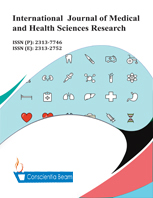Descriptive Assessment of Medical Outreach Services, Benefits and Factors Influencing Success of Outreach Program in Rural Communities of Enugu State
DOI:
https://doi.org/10.18488/journal.9.2020.71.1.9Abstract
Medical outreach services is evidence based strategy aimed to improve universal access to healthcare of underserved or rural populations. This study is aimed to describe the healthcare services delivered during medical outreach, benefits and the factors influencing the success of outreach program in a rural low resource country. The study was a community based descriptive cross sectional study of 660 adult participant in Enugu State with health complains within the services of an ongoing medical outreach. A two - stage sampling technique was used to select the communities where a total population study was done. A mobile fixed method of outreach was used and data collected were analyzed using proportions and chi – square. About half, 52.5% of participants received promotive services as a gateway to the outreach services. One quarter (27.4%) of adults screened was positive for malaria parasite. The prevalence of HIV (1.8%), diabetes (4.1%), hypertension (45.6%), overweight (27.0%) and obesity (10.9%) were within the national levels. As many as 86.1% received treatment for common illnesses. The commonest factors for success of the outreach were free services, presence of doctors, nurses and drugs, nearness of communities and influence of community leaders of which free services was associated with uptake of services. Medical outreach services mirrors primary healthcare services and when standardized for actors and players willing to use it for cooperate social responsibilities, it will serve as a useful tool for universal health access.

